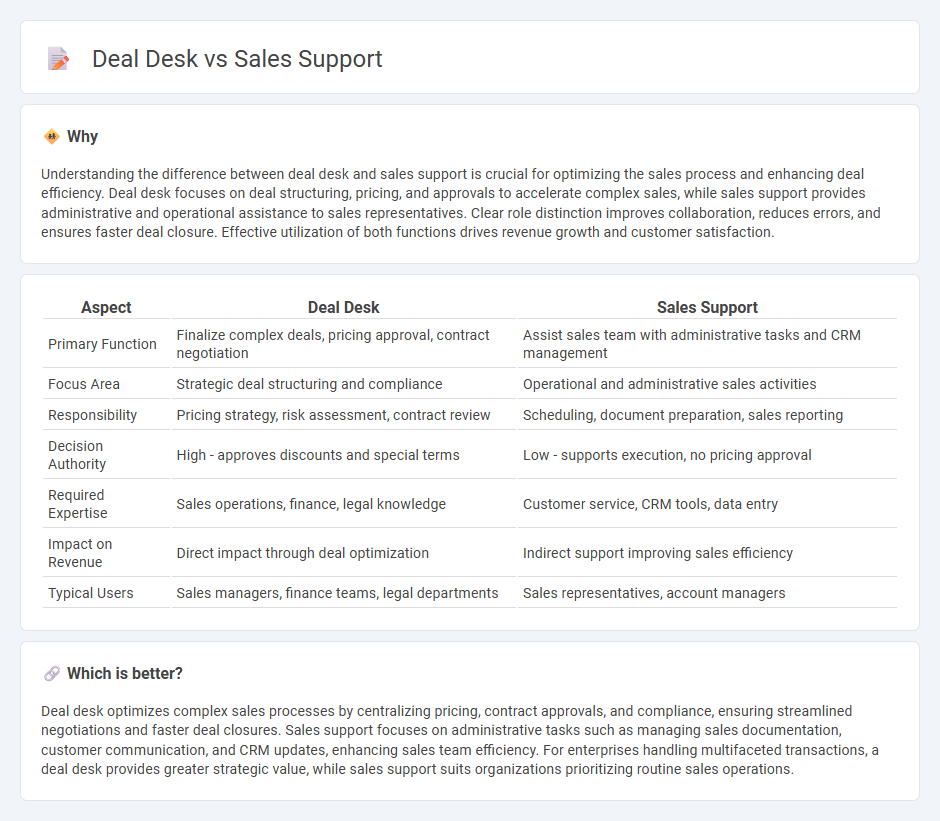
Deal Desk streamlines complex sales processes by coordinating pricing, approvals, and contract management to accelerate deal closures. Sales Support focuses on assisting sales teams with administrative tasks, lead tracking, and customer communication to enhance overall efficiency. Explore how each function uniquely contributes to driving revenue growth and sales success.
Why it is important
Understanding the difference between deal desk and sales support is crucial for optimizing the sales process and enhancing deal efficiency. Deal desk focuses on deal structuring, pricing, and approvals to accelerate complex sales, while sales support provides administrative and operational assistance to sales representatives. Clear role distinction improves collaboration, reduces errors, and ensures faster deal closure. Effective utilization of both functions drives revenue growth and customer satisfaction.
Comparison Table
| Aspect | Deal Desk | Sales Support |
|---|---|---|
| Primary Function | Finalize complex deals, pricing approval, contract negotiation | Assist sales team with administrative tasks and CRM management |
| Focus Area | Strategic deal structuring and compliance | Operational and administrative sales activities |
| Responsibility | Pricing strategy, risk assessment, contract review | Scheduling, document preparation, sales reporting |
| Decision Authority | High - approves discounts and special terms | Low - supports execution, no pricing approval |
| Required Expertise | Sales operations, finance, legal knowledge | Customer service, CRM tools, data entry |
| Impact on Revenue | Direct impact through deal optimization | Indirect support improving sales efficiency |
| Typical Users | Sales managers, finance teams, legal departments | Sales representatives, account managers |
Which is better?
Deal desk optimizes complex sales processes by centralizing pricing, contract approvals, and compliance, ensuring streamlined negotiations and faster deal closures. Sales support focuses on administrative tasks such as managing sales documentation, customer communication, and CRM updates, enhancing sales team efficiency. For enterprises handling multifaceted transactions, a deal desk provides greater strategic value, while sales support suits organizations prioritizing routine sales operations.
Connection
Deal desk streamlines complex sales processes by coordinating approvals, pricing strategies, and contract terms, ensuring alignment with sales support teams. Sales support provides critical administrative and technical assistance, facilitating efficient communication between sales reps and the deal desk. Together, they optimize sales cycles, enhance deal accuracy, and improve overall revenue conversion rates.
Key Terms
**Sales Support:**
Sales support teams streamline the sales process by providing administrative assistance, preparing sales materials, and managing customer inquiries to enhance sales efficiency and customer satisfaction. Their responsibilities include order processing, CRM management, and coordinating communication between sales representatives and other departments. Explore how effective sales support can drive your revenue growth and optimize sales operations.
Lead Qualification
Sales support teams primarily handle lead qualification by assessing the readiness and fit of prospects based on predefined criteria such as budget, authority, need, and timeline (BANT). Deal desks focus on supporting complex sales by ensuring pricing, contract terms, and approvals are aligned with the company's policies and strategic goals during later deal stages. Explore how optimizing lead qualification through both functions can drive higher conversion rates and streamlined sales cycles.
CRM Management
Sales support handles CRM management by maintaining accurate customer data, tracking interactions, and ensuring seamless communication across sales teams. Deal desk focuses on optimizing CRM workflows for deal approvals, pricing strategies, and contract compliance to accelerate sales cycles. Explore more to understand how these roles enhance CRM efficiency in your sales processes.
Source and External Links
What is Sales Support? A Comprehensive Guide for Business - Sales support assists the sales team by handling customer inquiries, providing sales data for strategic decisions, and facilitating communication between sales teams and clients to ensure smooth sales operations.
Sales Support: Everything You Need to Know - Joburn - Sales support includes technical, marketing, administrative, and sales enablement roles that provide training, create marketing materials, manage appointments, and equip sales teams with essential resources.
Sales Support: What It Is and Why It's Essential - Salesforce - Sales support handles lead management, data management and analysis within CRMs, and customer communication, ensuring timely follow-up on leads and maintaining customer records to boost sales effectiveness.
 dowidth.com
dowidth.com